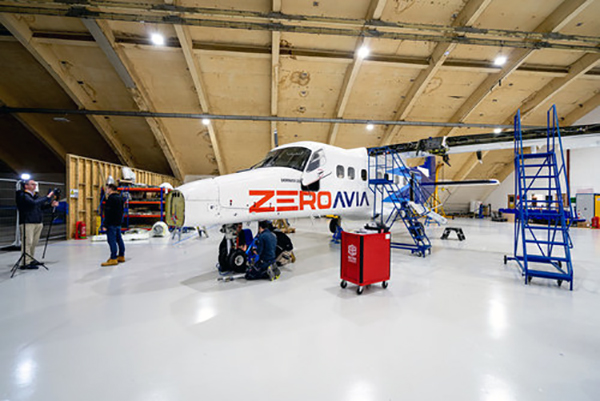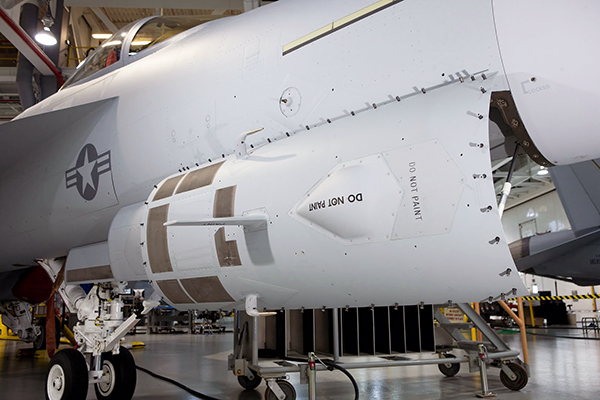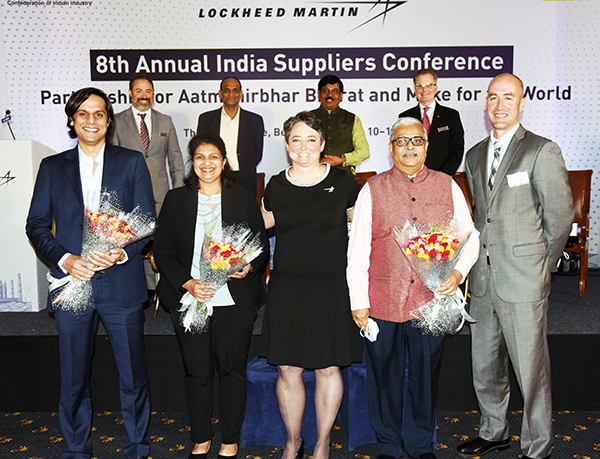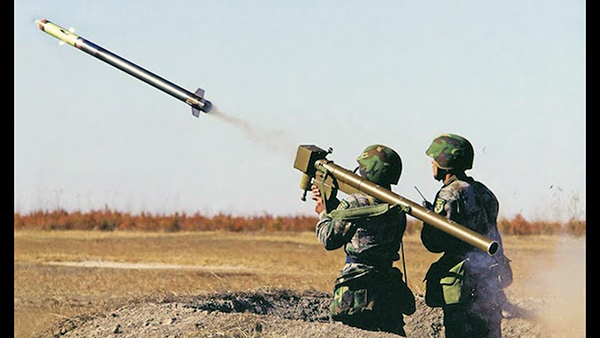BDL signs ₹471.41 cr contract for IGLA-1M
Bharat Dynamics Limited (BDL) and Indian Army signed a contract worth ₹471.41 crore for refurbishment of IGLA – 1M missiles. After the refurbishment, a fresh lease of life will be given to the missile for 10 years with the contract signed in New Delhi on 1 December.
In addition to carrying out refurbishment, the public sector defence unit also deals with manufacture and supply of guided missiles and associated equipment, underwater weapon systems, airborne weapon systems, ground support equipment and product life cycle support.
To upgrade its technological capability, the firm has made a paradigm shift in its manufacturing processes by leveraging niche technologies, adopting practices like industry 4.0, and operating latest surface mounted devices assembly lines, said a press release.
Defence Industrial Corridors in Tamil Nadu
Minister of State for Defence Ajay Bhatt informed the Rajya Sabha on 6 December, that three proposals have been sent by the Government of Tamil Nadu to Government of India concerning Tamil Nadu Defence Industrial Corridor (TNDIC). The details and status of these proposals are as follows:
• Establishment of testing facilities under Defence Testing Infrastructure Scheme (DTIS) of Ministry of Defence (MoD). The State Government has been directed to participate in the tender process and follow the procedure/ scheme guidelines in this regard.
• Leasing of about 160 acres of defence land in taluka Ulundurpettai, Viluppuram district of Tamil Nadu for creation of Aviation Technology Hub. This proposal is outside the identified nodes of TNDIC.
• A proposal has been submitted to Airport Authority of India (AAI) for establishment of Aircraft MRO Complex in 50 acres of land at Chennai Airport.
The Defence Industrial Corridors including TNDIC have been established to attract investments from public / private industries to develop defence manufacturing ecosystem. As per information received from Government of Tamil Nadu, action has been taken to develop TNDIC and an Aerospace &Defence (A&D)policy for incentivizing investments bythe industries in the TNDIC has been notified. They have started land acquisition and taken action to develop defence industrial parks, aerospace parks etc. and signed Memorandum of Understanding (MoUs) with 39 private/public industries. Against the projected investments worth Rs. 12226.00 crore as per MoUs with various private/public industries in the TNDIC, investment of more than Rs 2,200 crore have already been made in the last three years. Further, the State Government of Tamil Nadu has also spent Rs. 30 Crore for development of Aerospace park.
HAL and Zeroavia to collaborate on Hydrogen Powertrain
ZeroAvia, the leading innovator in zero emission aviation, has announced a development collaboration with the Indian state-owned aerospace & defence company Hindustan Aeronautics Ltd (HAL) for a hydrogen-electric powertrain capable of flying the 19 seat Dornier 228 aircraft up to 500 NM.
HAL intends to work with ZeroAvia to develop a Supplemental Type Certificate (STC) to allow retrofit of existing airframes for both Indian military and worldwide operators. HAL also intends to continue to build new aircraft with additional FAA approval, designated Hindustan-228, creating the opportunity to incorporate ZeroAvia’s ZA600 zero-emission engines. Additionally, HAL and ZeroAvia engineers will integrate ZeroAvia’s ZA600 hydrogen-electric powertrain into the Dornier 228 airframe. ZeroAvia will work closely with HAL and aircraft regulators during this project to ensure that aircraft meets both safety and operational requirements.


Approximately 270 Dornier 228 aircraft have been manufactured globally, with 242 currently in service. The production line of Do-228 aircraft is operational at HAL, India (Transport Aircraft Division, Kanpur, UP, India).
HAL and ZeroAvia engineers will integrate ZeroAvia’s ZA600 hydrogen-electric powertrain into the Dornier 228 airframe. HAL signed a technology transfer agreement with Dornier in 1983 and has produced main sub-assemblies and over 150 aircraft, including those operated by the Indian Military.
In late October 2021, ZeroAvia and Rotterdam The Hague Airport (RTHA) announced a partnership with the aim of establishing the world’s first hydrogen-electric international passenger route, using 19-seat aircraft such as HAL’s 228.
HAL delivers the 200th gun bay door for Hornets
Hindustan Aeronautics Limited has delivered the 200th gun bay door for Boeing F/A-18 Super Hornet. HAL said it has been supplying the aero-structure to Boeing for the last ten years.
“We see tremendous potential for India to contribute to the global aerospace industry as an industrial and technology partner. This partnership is a testimony to the world class capability of our industrial partners in the country,” President, Boeing India, Salil Gupte, was quoted as saying in an HAL statement on Friday.


HAL said its Aircraft Division has been a trusted supplier to Boeing for the last three decades. The Division has supplied various aero-structures for Boeing’s military and civil programmes such as the B757 Over-wing Exit Doors, 777 Up-lock Box, F/A-18 Wire Harness and F/A-18 Gun Bay Door, it was stated.
Indonesia seeks Indian defence tech, joint production
Indonesia has sought defence technology from India to bolster its security apparatus amid Chinese expansionist tendencies in the region. Southeast Asia’s biggest nation is exploring joint defence production with India, ET has learnt, and is considering the possibility of jointly producing military vehicles and water cannons.
The proposed initiatives are being planned on Indonesian territory as that would enable it to acquire skills in defence technology.
Expanding the defence partnership and joint defence production were key items on the agenda when India’s deputy national security adviser Pankaj Saran travelled to Jakarta last week to meet Indonesian defence minister Prabawo Subianto and key presidential aides, including presidential chief of staff H Moeldoko.
Counter terrorism and deradicalisation also figured in Saran’s meetings. In his meeting with Saran on December 8, Moeldoko is understood to have said that Indonesia and India have several common interests including in the defence sector.
Jakarta and New Delhi are expected to focus on technology transfer and development of local manufacturing industries in the defence sector. While Indonesia is not a claimant in the South China Sea region, Jakarta remains wary of Beijing’s growing ambitions in the region.
India and Indonesia have also decided to expand their maritime cooperation and partnership in the Indian Ocean Region. Indian firms are planning to build ports in Indonesia, ET has learnt.
In 2018, Indonesia and India held the First Indonesia-India Security Dialogue (IISD-1) in New Delhi. National security adviser Ajit Kumar Doval is hoping that the second security dialogue can be held in near future. Last year, notwithstanding the Covid-19 pandemic, Subianto visited India to meet defence minister Rajnath Singh.
The issue of possible export of BrahMos cruise missiles to Indonesia and ways to further deepen maritime security cooperation had figured prominently in the talks. The two countries also inked a new defence cooperation agreement in 2018 during PM Modi’s visit to Indonesia.
In May 2018, India and Indonesia established a ‘Comprehensive Strategic Partnership’. Its key takeaways were the adoption of the “Shared Vision on Maritime Cooperation in the Indo-Pacific” which aimed at greater maritime cooperation.
Lockheed nod for F-16 wings in India
US aerospace company Lockheed Martin today approved the manufacturing of wings of F-16 fighter jets at the Tata-Lockheed Martin Aerostructures Limited (TLMAL) facility in Hyderabd. The joint venture with Tatas will cater to the global market.
Hyderabad-based Tata-Lockheed Martin Aerostructures Limited (TLMAL) facility has been certified to makeF-16 fighter jet wings
Annually, the facility can make 50 pairs of wings, which can carry fuel, perform and fly at ‘9G’ and have 12,000-hour lifespan
The US firm formally recognised, on 7 December, TLMAL as a potential co-producer of F-16 wings. The facility has the capacity to make 50 pairs of wings a year, Lockheed Martin officials said. A ceremonial event marking the first fighter wing prototype built at the TLMAL facility here was attended by KT Rama Rao, Minister for Industries and Commerce, Telangana.
William Blair, vice-president and chief executive of Lockheed Martin India, said, “We are doing transfer of technology and wing-making is an example.” Lockheed Martin is in race to bid for Indian Air Force tender for 114 fighter aircraft. Sukaran Singh, managing director and chief executive officer of Tata Advanced Systems Limited, said, “If we win the tender, we can make 50 aircraft a year.”
Rossell Techsys to build EWIS parts for the MH-60R Platform
Rossell Techsys has been awarded a contract with Lockheed Martin to build Electrical Wire Harness and Interconnect System (EWIS) parts in support of Lockheed Martin’s MH-60R aircraft that are being supplied to the Indian Navy.
Last year, India signed a USD $2.1 billion deal with the United States Government as part of its Foreign Military Sales program for the purchase of 24 Lockheed Martin anti-submarine MH-60R helicopters. The first three of these MH-60R all-weather helicopters, which can support multiple missions with state-of-the-art avionics and sensors, have been delivered to the Indian Navy and are currently undergoing pilot and crew training in the United States.


The delivery of 24 helicopters will be completed in five years from the time the deal was concluded. The helicopters will be modified with a variety of “India-unique” equipment and weapons. The induction of these fourth-generation MH-60Rs is expected to further enhance the Indian Navy’s three-dimensional capabilities.
As part of the contract received from Lockheed Martin, Rossell Techsys shall perform “Build to Print” (BTP) manufacture of the wire harnesses that will be installed on the MH-60R. Manufacture of these parts is being performed in the “Center of Excellence” (COE), set up by Rossell Techsys for Lockheed Martin platforms. The manufacture of parts has commenced, with the first parts having successfully undergone acceptance by Lockheed Martin. The contract shall also enable Lockheed Martin to obtain offset credits towards this platform sale.
Private firm makes non-lethal weapons to tackle barbed clubs
After the Chinese troops used barbed clubs and tasers against the Indian security forces in the Galwan valley clash, Indian security forces have also now been provided non-lethal weapons to tackle the Chinese during violent face-offs along the Line of Actual Control.
Showcasing the different equipment, Mohit Kumar, Chief Technology Officer of Apasteron Private Limited said a metal road taser with spikes has been developed with the name Vajra and it can be used for both tasing aggressively attacking enemy soldiers in hand to hand combat as well as puncture their bullet-proof vehicles.
Kumar showcased the Trishul which can be used for tasing as well as blocking vehicles of adversaries while they try to enter prohibited areas.
He said the best response or feedback coming from tasing equipment is called ‘Sapper Punch’ which can be worn like winter protection gloves and can be used to give a blow or two with a current discharge to aggressor enemy troops.
While demonstrating the capabilities of the different types of equipment provided to the Indian troops, Kumar said that none of them can cause deaths or any serious injury but can stun the enemy troops, while making them ineffective temporarily during hand to hand engagement.
The Chinese Army troops had attacked Indian soldiers in the Galwan valley for wearing full riot gear, used tasers and barbed clubs with an aim of causing serious injuries on the border where bullets had not been fired for more than four decades till last year.
Soon after the clash, the Indian troops had also started looking for protective gear as well as equipment to be used in response to the Chinese unconventional weapons.
HAL, IOFB, BEL in top 100 arms sales globally
Three Indian companies are among the world’s top 100 for combined arms sales in 2020, said a new report by the Stockholm International Peace Research Institute (SIPRI), which tracks global arms trade. The three are: Hindustan Aeronautics Limited (HAL), Indian Ordnance Factories, and Bharat Electronics Limited (BEL). Of these, the Ordnance Factory Board (OFB), which comprised the Indian Ordnance Factories, has been dissolved and seven new Public Sector Undertakings created in its place.
The three were ranked among the top 100 in arms sales in 2019 as well.
In the latest rankings, HAL is at number 42 with US$ 2.97 billion, up 1.5 per cent from 2019 sales. Indian Ordnance Factories are at the 60th spot, with US$ 1.9 billion in sales, up 0.2 per cent from the previous year. BEL is ranked 66, with US$ 1.63 billion in arms sales, up 4 per cent compared to 2019.
However, India has the smallest share among the top 11 defence manufacturing nations. With 41 arms companies, the USA has the high¬est number of companies in the top 100 worldwide, the SIPRI report said. Together, their arms sales amounted to $285 billion, an increase of 1.9 per cent compared with 2019.













